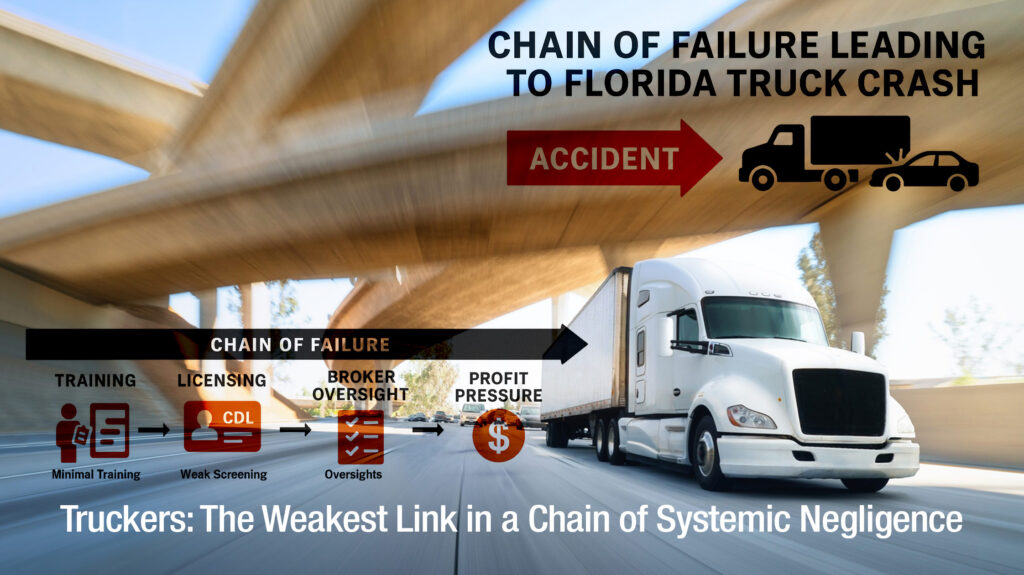The August 12, 2025, crash on Florida Turnpike, where Truckers Harjinder Singh’s illegal U-turn killed Herby Dufresne, Rodrigue Dor, and Faniola Joseph, is more than a driver’s error—it’s the culmination of a flawed system that funneled an unqualified individual into a high-stakes role. Singh, who entered the US illegally in 2018, may or may not required to passed FMCSA’s ELDT (mandated 2022) with minimal scrutiny, secured CDLs from California and Washington despite failing English proficiency (2/12 correct on a DOT test) and road sign tests, and was hired by a broker lax on safety checks. He’s the “last nail in the coffin,” but the coffin was built by inadequate training, permissive licensing, and profit-focused hiring.
If FMCSA’s own educational audit is meant to vet applicants, how did Harjinder Singh manage to secure motor carrier authority without raising red flags?
The US trucking industry is plagued by unsafe practices: coercion forcing drivers to ignore rules, per-mile incentives promoting fatigue, and brokers selecting carriers based on price rather than safety metrics. FMCSA aims to regulate these, but gaps persist, as seen in the $50.5 million funding threat to non-compliant states.
Why This Wasn’t Just “Truckers’ Mistake”
Minimal Training
FMCSA’s Entry-Level Driver Training (ELDT) program requires no minimum behind-the-wheel hours. That means drivers can pass on paper yet lack the real-world readiness to handle high-speed highways, emergency maneuvers, or restricted turnarounds.
Licensing Failures
California’s DMV issued Singh a CDL despite poor test results and limited English skills. Federal regulators have now warned that states ignoring English-language standards risk losing millions in safety funding.
Broker Negligence
The freight broker who hired Singh failed to vet. Too often, brokers prioritize the cheapest bid over the safest option—a practice that exposes families on the road to deadly risk.
To avoid future accidents rooted in training and skills deficits, here’s what we can do:
| Component | Issue Highlighted | Proposed Fix |
| ELDT & Language Testing | Minimal hours; Singh failed English (2/12) and signs | Mandate 50-100 behind-the-wheel hours, rigorous oral/written English tests, and sign literacy benchmarks. |
| State CDL Issuance | Lax enforcement in CA, WA, NM | National standards with audits; tie funding to compliance. |
| Broker & Carrier Vetting | Negligent selection ignoring safety ratings | Require FMCSA SMS reviews, insurance verifications; steeper penalties for failures. |
| Coercion & Unsafe Practices | Pressure for violations prioritizing profits | Strengthen FMCSA enforcement, whistleblower protections, AI monitoring for compliance. |
| Overall Regulation | Profit over safety in FMCSR | Shift to safety-first metrics, incentives for advanced training, and visa scrutiny for foreign drivers. |
A Profit-Driven Industry Culture
The Florida crash reveals the broader reality:
- Per-mile pay pressures drivers to speed and extend hours.
- Coercion by shippers and brokers forces drivers to accept unsafe loads or schedules.
- Maintenance shortcuts and overloading maximize profits while undermining safety.
FMCSA rules prohibit these practices—but enforcement is weak, and penalties rarely outweigh profits.
Lives are collateral when safety takes a back seat to profitability.
The Roadmap to Real Reform
- Strengthen ELDT Standards
- Require 50–100 supervised driving hours before CDL issuance.
- Include training for real-world hazards, not just classroom basics.
- Uniform CDL Enforcement
- Enforce consistent English proficiency and road-sign literacy tests
- Tie CDL audits directly to federal funding compliance.
- Broker Accountability
- Make it mandatory for brokers to vet carriers using FMCSA’s Safety Measurement System (SMS) and insurance records.
- Penalize brokers for negligent motor carrier selection.
- Combat Coercion
- Expand protections for drivers pressured into unsafe work.
- Enforce FMCSA’s coercion rules with meaningful fines and penalties.
- Safety-First FMCS
- Shift the focus of regulation away from profit-driven deregulation toward public safety and accountability.
By prioritizing these reforms, we can rebuild a safer trucking system where drivers aren’t the weak link in a chain of negligence.
This crash should never have happened. Harjinder Singh was reckless, but the system created the conditions for disaster long before he turned that wheel.
Until we treat safety as the non-negotiable foundation of trucking, not an afterthought, more families will suffer the same fate.
The driver is the last nail in the coffin—but the coffin is built by systemic negligence.
👉 The Truck Owners and Drivers Association is leading the charge for reform—fighting for stronger training standards, broker accountability, and a safety-first trucking system.
Join the Movement → #JoinTODA
#FloridaTruckAccident #HarjinderSingh #TruckingSafetyReform #FMCSARegulations #CDLReform #TruckDriverTraining #PreventTruckAccidents #RoadSafetyUSA #BrokerLiability #UStruckingIndustry


